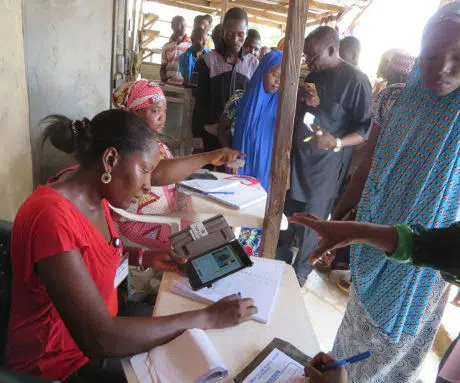
The International Fertilizer Development Center (IFDC) has signed up 470,000 farmers for GES Touch and Pay (TAP), an NFC-based service now live in the FCT and Sokoto states of Nigeria. The organisation hopes to have 500,000 farmers signed up in the coming weeks.
The TAP project makes use of contactless cards supplied to farmers and NFC-enabled Nexus 7 tablets that are placed at redemption points across both states. GES, which stands for Growth Enhancement Support, is a subsidy provided by the government to farmers so they can afford to buy fertilizer, seed and other agricultural inputs to grow food. TAP is a joint venture between GES and Consult Hyperion.
Farmers visiti one of the redemption points and tap their card against a Nexus 7 tablet, which allows the agro dealer at the redemption centre to confirm the farmer’s identity, see the government-funded vouchers to which the farmer is entitled and supply the farmer with the products they demand. The farmer then pays the remaining amount and again taps his card on the tablet to complete the transaction.
“First of all, we have to register farmers for the service and, secondly, they have to be issued vouchers which they can redeem,” Susie Lonie from the mobile money practice team at Consult Hyperion explained to NFC World+. “We have been registering farmers by sending out teams of 200 to 250 field staff using these NFC tablets and gathering data about the farmers.
“They collect data and photographs of both the farmer and the farmer’s national ID card, and then they issue each of these farmers with an NFC-enabled card, a simple TAP card. Farmers take these cards away with them and we return all of the data collected in our database using the local mobile network if there is coverage, or by copying data to field staff tablets and forming a mesh communications network of humans with tablets until one reaches coverage and can upload the data.
“Now that we have got these people registered, each of the agro dealers are given a Nexus 7 tablet that has been preloaded with the information. The farmer turns up and he taps his card to the agro dealer’s tablet and up comes a photograph of the farmer. When the agro dealer can confirm that that is indeed the farmer standing in front of him, the agro dealer then taps a button and up come the various vouchers to which the farmer is entitled.
“The farmer then says ‘OK, I’ll have two bags of fertilizer and a bag of seeds’. The agro-dealer says ‘OK, that will cost you X’. The farmer then hands over the money and completes the transaction by tapping his NFC card on the Nexus 7 tablet. The farmer gets a receipt and will go to the warehouse to get the bags of fertilizer and the bag of seed.
“Everything is powered by, in the first instance, the farmer having a card that they can tap and the NFC-enabled tablet confirming who the farmer is and, therefore, to what they are entitled, and whether they have yet redeemed any of their vouchers.
“These cards are absolutely at the core of everything we are doing; this is an NFC service and for me, I’ve got to say, that it hits all the buttons.”
“We now have 470,000 farmers that have NFC cards and our target is 500,000, and I think we may actually exceed that,” Lawrence Tweed, project lead for the GES TAP service, added. “Currently, we have about 400 Nexus 7 tablets in use. In FCT, we have 58 tablets in use for redemption and 29 locations, so there are two tablets in each of the 29 locations throughout the FCT.
“In Sokoto, we have 148 tablets being used for the 74 locations where farmers go to redeem their discounted inputs using their NFC cards. Field staff who go out to register farmers are also using Nexus 7 tablets in both states to do so.
“We’re using NFC to extend connectivity to where there is no network coverage; TAP reaches the part where other mobile networks don’t reach and, by doing so, we empower the farmers by enabling them to participate in the GES program.”
“But, there is a bigger picture here,” Lonie added. “This is just a pilot in Nigerian terms but for Nigeria and anywhere else in emerging markets where communications aren’t yet as good as we would like them to be, the opportunity is much larger.
“This could easily be extended to things like vouchers for a health centre, or it could be extended to transportation for instance; it could allow people to get around the country. Certainly education is a good potential use case for this in emerging markets. We can imagine the end user giving out vouchers so that girls can get to school.
“In some parts of the developed world, NFC can sometimes be a solution looking for a problem but we have got plenty of problems here in Africa and it is an ideal solution for quite a few of them.”
Next: Visit the NFCW Expo to find new suppliers and solutions